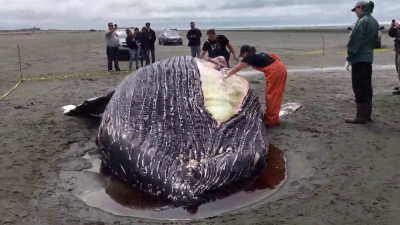
Beaching of dead whales is common. Many factors such as disorientation, genetic mutation, illness, injury from predators or entanglement in fishing gear may play a role.
People are often seen inspecting the carcass or taking pictures of it. But it is not safe to stand close to a dead whale because it could explode. When a whale dies in the wild, it sinks to the ocean floor where it’s scavenged by sharks, fish and tiny worms over many years.
But when a dead whale washes ashore, gas (usually methane) builds up inside the carcass as the stomach content starts to decompose.
Due to the whale’s thick skin, the gas can’t be released. When beached whales are poked or moved by bystanders, the skin may rip, unleashing a mix of internal organ, gas and stomach content – sometimes at a high pressure. This explosion may hurt the bystanders. The bigger the animal, the more the gas and pressure.
The build-up, and subsequent release of gas happens with most animals as they decompose. Because whales are so much bigger, the explosion is noticeable.
Picture Credit : Google




